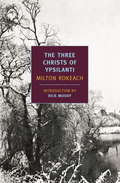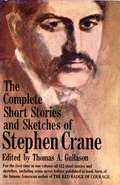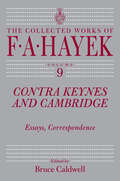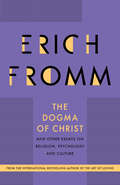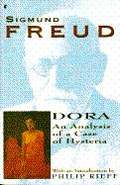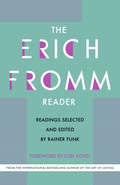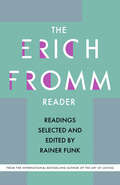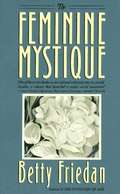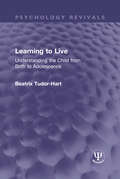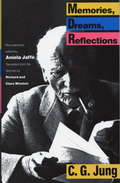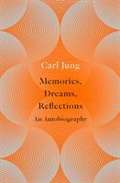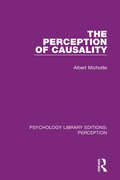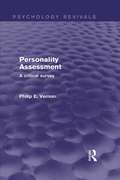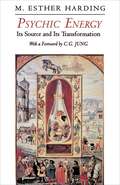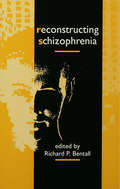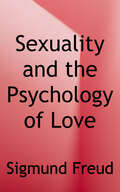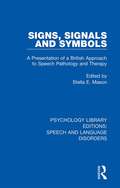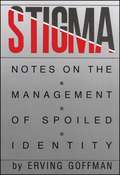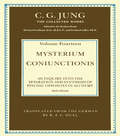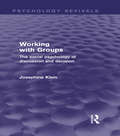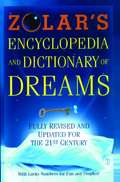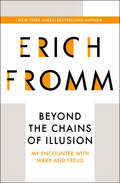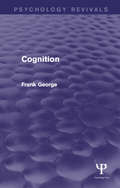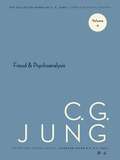- Table View
- List View
The Three Christs of Ypsilanti: A Psychological Study
by Milton RokeachIn 1960 psychologist Milton Rokeach staged an unusual experiment to study questions of identity and delusional thinking. He brought together three chronic schizophrenic patients at Ypsilanti State Hospital in Michigan, each of whom believed himself to be Jesus Christ. For over a year the research team and the three patients met daily. This book is an account of what occurred in and outside these meetings as the three Christs struggled to adjust their concept of themselves against the fact that others claimed the same identity. Although some of the researchers' methods seem questionable by today's standards, this is a fascinating look at how beliefs are formed and sustained, and a poignant portrayal of three deeply troubled human beings.
The Three Christs of Ypsilanti
by Rick Moody Milton RokeachOn July 1, 1959, at Ypsilanti State Hospital in Michigan, the social psychologist Milton Rokeach brought together three paranoid schizophrenics: Clyde Benson, an elderly farmer and alcoholic; Joseph Cassel, a failed writer who was institutionalized after increasingly violent behavior toward his family; and Leon Gabor, a college dropout and veteran of World War II.The men had one thing in common: each believed himself to be Jesus Christ. Their extraordinary meeting and the two years they spent in one another's company serves as the basis for an investigation into the nature of human identity, belief, and delusion that is poignant, amusing, and at times disturbing. Displaying the sympathy and subtlety of a gifted novelist, Rokeach draws us into the lives of three troubled and profoundly different men who find themselves "confronted with the ultimate contradiction conceivable for human beings: more than one person claiming the same identity."u're not!" "I'm God, Jesus Christ and the Holy Ghost! I know what I am. . .") we see the three Christs argue, proclaim, and soliloquize about the nature of their contentious divinity, and are given a window onto one of the most remarkable psychological case studies on record.
The Complete Short Stories and Sketches of Stephen Crane
by Stephen Crane Thomas A. Gullason790 pages - For the first time in one volume all 112 short stories and sketches, including some never before published in book form, of the famous American author of The Red Badge of Courage.
Contra Keynes and Cambridge: Essays, Correspondence (The Collected Works of F. A. Hayek #9)
by Friedrich A. Hayek edited by Bruce CaldwellIn 1931, when the young F. A. Hayek challenged the economic theories of John Maynard Keynes, sixteen years his senior, and one of the world's leading economists, he sparked a spirited debate that would influence economic policy in democratic countries for decades. Their extensive exchange lasted until Keynes's death in 1946, and is reprinted in its entirety in this latest volume of The Collected Works of F. A. Hayek. When the journal Economica published a review of Keynes's Treatise on Money by Hayek in 1931, Keynes's response consisted principlally of an attack on Hayek's own work on monetary theory, Prices and Production. Conducted almost entirely in economics journals, the battle that followed revealed two very different responses to a world in economic crisis. Keynes sought a revision of the liberal political order-arguing for greater government intervention in the hope of protecting against the painful fluctuations of the business cycle. Hayek instead warned that state involvement would cause irreparable damage to the economy. This volume begins with Hayek's 1963 reminiscence "The Economics of the 1930s as Seen from London," which has never been published before. The articles, letters, and reviews from journals published in the 1930s are followed by Hayek's later reflections on Keynes's work and influence. The Introduction by Bruce Caldwell puts the debate in context, providing detailed information about the economists in Keynes's circle at Cambridge, their role in the acceptance of his ideas, and the ways in which theory affected policy during the interwar period. Caldwell calls the debate between Hayek and Keynes "a battle for the minds of the rising generation of British-trained economists. " There is no doubt that Keynes won the battle during his lifetime. Now, when many of Hayek's ideas have been vindicated by the collapse of collectivist economies and the revival of the free market around the world, this book clarifies Hayek's work on monetary theory-formed in heated opposition to Keynes-and illuminates his efforts to fight protectionism in an age of economic crisis. F. A. Hayek (1899-1992), recipient of the Medal of Freedom in 1991 and co-winner of the Nobel Memorial Prize in Economics in 1974, was a pioneer in monetary theory and the principal proponent of classical liberal thought in the twentieth century. He taught at the University of London, the University of Chicago, and the University of Freiburg.
The Dogma of Christ
by Erich FrommThe essays in this fascinating volume examine present-day psychological and cultural problems with the keen insight and humanistic sympathies characteristic of Erich Fromm's work. The Dogma of Christ and Other Essays provides some of the sharpest critical insights into how the contemporary world of human destructiveness and violence can no longer separate religion, psychology and politics. The book brilliantly summarizes Fromm's ideas on how culture and society shape our behavior.
Dora: An Analysis of a Case of Hysteria
by Sigmund FreudThe case history involves a complicated set of liaisons of Dora, her father, her mother, Mr. K., Mrs. K., and the governess.
The Erich Fromm Reader
by Erich Fromm Rainer Funk Joel KovelFromm's basic idea was to look at the individual as a social being and to look at society as an ensemble of many individuals who have not only common ideas and convictions based on a common practice of life but also a common psychic structure. With his concept of "social character" he created a new interdisciplinary thinking presented in this reader. The Erich Fromm Reader exhibits the true genius of an original thinker in seeing the connections between overlapping knowledge from many different fields. Here interdisciplinarity is not only a lip service but the impact of Erich Fromm's unique social psychological notion.
The Erich Fromm Reader: Readings Selected and Edited by Rainer Funk
by Erich Fromm&“Fromm crossed the boundaries of traditional disciplines to expound his view on the alienation of man in an increasingly technological world.&” —Newsweek Erich Fromm&’s basic idea was to look at the individual as a social being, and to look at society as an ensemble of many individuals who have not only mutual ideas and convictions based on a common practice of life, but also a shared psychic structure. With his concept of &“social character,&” Fromm created a new interdisciplinary thinking presented in this compendium.The Erich Fromm Reader exhibits the true genius of an original thinker in seeing the connections between overlapping knowledge from many different fields. Here, interdisciplinarity is not only a lip service but the impact of Erich Fromm&’s unique social psychological notion.
The Feminine Mystique
by Betty FriedanFirst published in 1963, "The Feminine Mystique" ignited a revolution that profoundly changed our culture, our consciousness, and our lives. Today it newly penetrates to the heart of issues determining our lives -- and sounds a call to arms against the very real dangers of a new feminine mystique in the economic and political turbulence of the 1990s. Three decades later, the underlying issues raised by Betty Friedan strike at the core of the problems women still face at home and in the marketplace. As women continue to struggle for equality, to keep their hard-won gains, to find fulfillment in their careers, marriage and family, "The Feminine Mystique" remains the seminal consciousness-raising work of our times.
Learning to Live: Understanding the Child from Birth to Adolescence (Psychology Revivals)
by Beatrix Tudor-HartOriginally published in 1963, this account, based on a lifetime of first-hand experience of the growing child, covers all the situations and problems which a child – and its parents and educators – meet in the first twelve years of life, from the earliest of feeding and sleeping right through to learning to read, write, and adjust happily to other people. Every parent wants to be sure that his or her child gets the best possible start in life. At the time so many books that were supposed to deal with the formative years of a child’s life gave advice that was incomplete, conflicting or ambiguous. It was for this reason that there had been so many pleas for a book which gave full explanations for its recommendations without sacrificing either warmth or humanity. The author produced such a book. The late Beatrix Tudor-Hart’s early study of psychology at Cambridge and in Germany and America was followed by six years of running her own nursery kindergarten for children of two to seven years, until in 1933 she felt that it was wrong to separate this age group from older children. For sixteen years, from 1938–1954, she ran a cooperative, non-profitmaking school for children of two to twelve years. At the time of original publication, the author was a lecturer in Child Psychology for Department of Child Care at the North Western Polytechnic, London.
Memories, Dreams, Reflections
by Aniela Jaffe Clara Winston Richard Winston C. G. JungIn the spring of 1957, when he was eighty-one years old, C. G. Jung undertook the telling of his life story. At regular intervals he had conversations with his colleague and friend Aniela Jaffé, and collaborated with her in the preparation of the text based on these talks. On occasion, he was moved to write entire chapters of the book in his own hand, and he continued to work on the final stages of the manuscript until shortly before his death on June 6, 1961.This edition of Memories, Dreams, Reflections includes Jung's VII Sermones ad Mortuos. It is a fully corrected edition. From the Trade Paperback edition.
Memories, Dreams, Reflections: An Autobiography
by Carl JungFour years before his death, Carl Gustav Jung, psychiatrist and psychologist, began writing his life story. But what started as an exercise in autobiography soon morphed into an altogether more profound undertaking. The result is an absorbing piece of self-analysis; a frank statement of faith, philosophy and principles from one of the great explorers of the human mind. Covering everything from Sigmund Freud, analytical psychology and Jungian dream interpretation to a forthright discussion of world myths and religions, including Christianity, Buddhism, and other faiths, Memories, Dreams, Reflections is a remarkable book showing a man of great depth, humility and perspicacity. Once read it is never forgotten.
The Perception of Causality (Psychology Library Editions: Perception #21)
by Albert MichotteOriginally published in 1963, this is a classic work on the psychology of perception. By means of suitable patterns on a partly concealed rotating disc Michotte was able to give the impression of objects in movement; and where certain conditions of speed, position, and time-interval were satisfied, his subjects received the impression of a causal interaction between two objects – for example, the impression that one object has ‘bumped into’ another (the ‘Launching Effect’) or is carrying it along (the ‘Entraining Effect’). In a further group of experiments Michotte studies the conditions in which moving objects look as though they are alive. A large number of experiments are described, and on the basis of them Michotte formulates a theory as to the conditions in which causal impressions occur. He also compares his own views on causality with those of Hume, Maine de Biran, and Piaget.
Personality Assessment: A critical survey (Psychology Revivals)
by Philip E. VernonOriginally published in 1964, the aim of this book was to analyse the psychological processes involved in understanding personality, and to consider how the psychologist could help in making more accurate assessments. Professor Vernon discusses in detail the scientific status of psychoanalytic and other ‘depth’ theories of motivation, the value of different types of psychotherapeutic treatment and counselling, the influence of upbringing on the development of personality, and the effectiveness of projective techniques. He also examines the reasons for the highly variable results obtained with personality tests and questionnaires. As well as providing a balanced review of theories of personality and of various types of test, this work made a fresh contribution to developing improved techniques of assessment.
Psychic Energy: Its Source and Its Transformation (Bollingen Series #670)
by Mary Esther HardingA study of the primitive and unconscious aspects of man's nature and the processes by which their energies may contribute to the integration of personality. New edition, comprehensively revised and enlarged, with many new illustrations.
Reconstructing Schizophrenia
by Richard P. Bentall`The summaries of evidence have provided ready-made challenges to previously unquestioned medical options ... the book provides a challenging update on the nature of scientific inquiry.' - British Journal of Clinical PsychologyDespite nearly one hundred years of research, very little progress has been achieved in the understanding of schizophrenic behaviour. There remains considerable uncertainty even about the fundamental features of the hypothesised illness.Reconstructing Schizophrenia subjects the difficult concept of schizophrenia to rigorous scientific, historical and sociological scrutiny. They ask why a biological defect has been assumed in the absence of hard evidence and look at what can be done psychologically to alleviate schizophrenic symptoms. Finally, they explore what new models and research strategies are required in order to understand schizophrenic behaviour. The result is a book that provides a distinctive and critical perspective on modern psychiatric theories and which demonstrates the severe limitations of an exclusively medical approach to understanding madness.
Sexuality and the Psychology of Love
by Sigmund FreudFrom Simon & Schuster, Sexuality and the Psychology of Love is Sigmund Freud's exploration of sexuality and the psychology of love. Sexuality and the Psychology of Love is Freud at his most brilliant, raising the curtain on a new era of sexual and social awareness, with an introduction from Philip Rieff.
Signs, Signals and Symbols: A Presentation of a British Approach to Speech Pathology and Therapy (Psychology Library Editions: Speech and Language Disorders)
by Stella E. MasonOriginally published in 1963, this title was an attempt to provide a new basis for the discipline of Speech Therapy. This was the first work to be published in England relating speech pathology to the wider study of human communication. It also contains results of original research into the problems of Dyslalia and Stammering. Several chapters are devoted to accounts of diagnostic measures and aids.
Stigma: Notes on the Management of Spoiled Identity
by Erving GoffmanThe author of The Presentation of Self in Everyday Life analyzes a person’s feelings about himself and his relationship to people society calls “normal.”Stigma is an illuminating excursion into the situation of persons who are unable to conform to standards that society calls normal. Disqualified from full social acceptance, they are stigmatized individuals. Physically deformed people, ex-mental patients, drug addicts, prostitutes, or those ostracized for other reasons must constantly strive to adjust to their precarious social identities. Their image of themselves must daily confront, and be affronted by, the image others reflect back to them.Drawing extensively on autobiographies and case studies, sociologist Erving Goffman analyzes the stigmatized person’s feelings about himself and his relationship to “normals” He explores the variety of strategies stigmatized individuals employ to deal with the rejection of others, and the complex sorts of information about themselves they project. In Stigma, the interplay of alternatives the stigmatized individual must face every day is brilliantly examined by one of America’s leading social analysts.“This short book established the conceptual understanding of stigma that continues to buttress contemporary sociological thinking.” —Sociological Review
THE COLLECTED WORKS OF C. G. JUNG: An Inquiry into the Separation and Synthesis of Psychic Opposites in Alchemy (Collected Works of C.G. Jung #No. 14)
by C.G. JungMysterium Coniunctionis was first published in the Collected Works of C.G. Jung in 1963. For this second edition of the work, numerous corrections and revisions have been made in cross-references to other volumes of the Collected Works now available and likewise in the Bibliography. Mysterium Coniunctionis was Jung's last work of book length and gives a final account of his lengthy researches in alchemy. It was Jung's empirical discovery that certain key problems of modern man were prefigures in what t he alchemists called their 'art' or 'process'. Jung maintained that 'the world of alchemical symbols does not belong to the rubbish heap of the past, but stands in a very real and living relationship to our most recent discoveries concerning the psychology of the unconscious'. The volume includes ten plates, a Bibliography, an Index, and an Appendix of original Latin and Greek texts quoted in the work.
Working with Groups: The Social Psychology of Discussion and Decision (Psychology Revivals)
by Josephine KleinOriginally published in 1963, this book was one of the first to explore group process and working with groups. The introductory chapter tells us that working with groups requires three skills: and understanding of theory, a knowledge of its application, and trained experience in its use. It goes on to discuss these points, helping the reader towards an understanding of group processes and making decisions in groups. This title is an early example of author’s explorations of groups and group work, which were to be a major factor in the establishment of group-work practice in Britain over the following years.
Zolar's Encyclopedia and Dictionary of Dreams
by ZolarThe completely revised and updated edition of the classic, best-selling guide to dream interpretation In the first major revision of the encyclopedia that has sold half a million copies worldwide, Zolar, the acclaimed "Dean of Astrology" (The New Yorker), has created the indispensable bedside reference for today's dreamers, reflecting the changes that have affected our waking hours and inevitably influence the content and significance of the messages we receive while we sleep. Looking at new cultural trends, work and social patterns, technologies and means of communication, Zolar reveals the meanings of dreams about cell phones, computers, cyberspace, beepers and much more. His concise and incisive explanations of such classic dreams as meeting a redheaded stranger, flying without wings and trying to comfort a crying baby are here as well, while obsolete subjects -- like girdles, gleaners and grenadiers -- have been eliminated. To complement each dream category a lucky number has been added for this new edition. With interpretations for more than 20,000 dreams, Zolar's Encyclopedia and Dictionary of Dreams offers you the opportunity to uncover the secrets hidden in your dreams and to act on the wisdom -- or respond to the warnings -- they contain.
Beyond the Chains of Illusion: My Encounter with Marx and Freud (Impacts Ser. #Vol. 21)
by Erich FrommProfound insights into Karl Marx and Sigmund Freud from the &“prolific and eclectic&” social theorist and bestselling author of Escape from Freedom (The Washington Post). According to renowned psychoanalyst Erich Fromm, three people shaped the essential character of the twentieth century: Albert Einstein, Karl Marx, and Sigmund Freud. While the first two figures had a great physical and political impact on the world, Fromm believes that Freud had an even deeper impact, because he changed how we think about ourselves. Beyond the Chains of Illusion is one of Fromm&’s most autobiographical works, as Fromm not only comments on the ideas of Freud and Marx, but also crystallizes his own theories on social character and unconscious values. The book brilliantly summarizes Fromm&’s ideas on how culture and society shape our behavior. This ebook features an illustrated biography of Erich Fromm including rare images and never-before-seen documents from the author&’s estate.
Cognition (Psychology Revivals)
by Frank H. GeorgeOriginally published in 1962, the problems of cognition dealt with in this book include learning, perception, thinking, memory and linguistic behaviour. It is not a textbook in the ordinary sense, since it presents a particular approach to the subject through experimental psychology, and also, to some extent, through philosophy, cybernetics and logic. A brief mention is made of ethological and physiological matters. It argues that cognition is a stepping-stone to integration with allied sciences. A large-scale study of the organism-as-a-whole needs to be supplemented by other biological and logical studies, but preparatory to this, cognitive psychologists must try and discover more rigorous ways of presenting their theories and models, since the mode of communicating an idea can never be wholly separated from that idea. Furthermore cognition, even at the organism-as-a-whole level, needs to broaden out and link up with social studies and studies in personality and individual difference. This book, pointed to a new direction that psychology should take; without contributing greatly to existing knowledge in the obvious sense, it suggests new methods and new ways of regarding the existing knowledge at the time.
Collected Works of C. G. Jung, Volume 4: Freud and Psychoanalysis (The Collected Works of C. G. Jung #45)
by C. G. JungThe authoritative edition of Jung&’s essential writings for understanding his early enthusiasm for—and later split with—Freud and psychoanalysisFreud and Psychoanalysis gathers Jung&’s writings on Freud and psychoanalysis published between 1906 and 1916, along with two later, related papers. The book covers the period of the enthusiastic collaboration between the two pioneers of psychology through the years when Jung&’s growing appreciation of religious experience, his criticism of Freud&’s emphasis on pathology, and other differences led to Jung&’s formal break with his mentor. Part I features brief studies of Freud&’s theory of hysteria, dream analysis, the psychology of rumor, and other subjects. Parts II and III contain the essentials of the criticism that led to Jung&’s rupture with Freud, the most important of which is &“The Theory of Psychoanalysis.&” Part IV presents &“The Significance of the Father in the Destiny of the Individual.&” The book&’s final two pieces, &“Freud and Jung: Contrasts&” and the introduction to a book by W. M. Kranefeldt, further illuminate Jung&’s reassessment of psychoanalysis.

